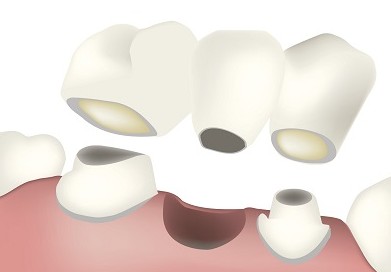When you lose teeth, several parts of your life can be affected. Missing teeth can make it difficult to eat and speak. Your intact teeth can shift in your mouth. This not only affects your chewing and speaking abilities, but it may change the shape of your face. Jaw bone shrinkage — also known as bone resorption — occurs over time as a result of long-term missing teeth or denture wear. It can occur in the upper jaw (maxilla) or lower jaw (mandible). Chewing on teeth stimulates the jaw bone and keeps it in full shape.
According to Dr. David Mugford of the Mugford Center for Periodontics & Dental Implants in Crofton, MD, “the alveolar bone, or the portion of the jaw bone that anchors the teeth in the mouth, no longer receives the necessary stimulation and begins to break down, or resorb when teeth are missing. Basically, the body is recognizing that it no longer uses or needs the jaw bone, so it deteriorates.”
There are many solutions to missing teeth. Bridges are a very common option to replace missing teeth and restore your life, and oral health, back to normal.
What is a Bridge?
A bridge is a dental appliance that is used to replace one or more missing teeth. Two crowns, which are supported by surrounding healthy teeth, contain the number of missing teeth between them. This is a traditional bridge, and is the most commonly used dental restoration.
There are two other types of bridges, notes Dr. Mugford. “A cantilever bridge is used only when there are adjacent teeth only on one side. A Maryland bridges uses metal ‘wings’ to attach the substitute fake teeth to surrounding teeth.”
Keeps Healthy Teeth in Place
When you are missing teeth, your jawbone begins to weaken, as your body transports essential nutrients elsewhere. Because of this, your healthy teeth can easily shift out of place. A bridge uses your existing teeth as an anchor and fills in the gaps between, keeping your teeth right where they belong.
Even Bite
A bridge not only restores your ability to speak and eat properly, it also makes your bite more even. Missing teeth can lead to added stress on surrounding teeth. This added force can wear down your enamel and affect your gum tissue.
Prevent Gum Disease
Due to your gum tissue being affected by tooth loss, your chances of developing gum disease become greater. “Because bridges restore order to your mouth, providing a normal bite, you are better able to prevent gum disease, provided you follow a good oral hygiene routine,” says Dr. Mugford.
“Bridges are an excellent option to restore order to your mouth. They can give you back your beautiful smile and make eating and speaking normal again. Not only that, but they also can help you to restore your oral health, keeping your gums and remaining teeth in good working order.”
Get More Information
If you are unsure whether you are a candidate for a dental bridge, you can visit us to get a thorough examination from our top experts. Do not hesitate to contact us if you need any further clarification regarding the procedure. Serving the wider Baltimore and Annapolis areas, the Crofton-based Mugford Center offers flexible scheduling options and can assist with your periodontics and dental implant questions. Call The Mugford Center for Periodontics & Dental Implants today at (410) 260-0790.

